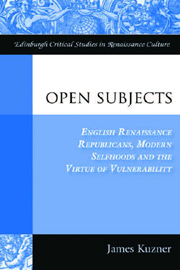Book contents
- Frontmatter
- Contents
- Acknowledgements
- Series Editor's Preface
- Introduction: Vulnerable Crests of Renaissance Selves
- 1 Legacies of Republicanism, Histories of the Self
- 2 ‘Without Respect of Utility’: Precarious Life and the Politics of Edmund Spenser's Legend of Friendship
- 3 Unbuilding the City: Coriolanus, Titus Andronicus and the Forms of Openness
- 4 ‘That Transubstantiall solacisme’: Andrew Marvell, Linguistic Vulnerability and the Space of the Subject
- 5 Habermas Goes to Hell: Pleasure, Public Reason and the Republicanism of Paradise Lost
- Epilogue: The Futures of Open Subjects
- Index
2 - ‘Without Respect of Utility’: Precarious Life and the Politics of Edmund Spenser's Legend of Friendship
Published online by Cambridge University Press: 12 September 2012
- Frontmatter
- Contents
- Acknowledgements
- Series Editor's Preface
- Introduction: Vulnerable Crests of Renaissance Selves
- 1 Legacies of Republicanism, Histories of the Self
- 2 ‘Without Respect of Utility’: Precarious Life and the Politics of Edmund Spenser's Legend of Friendship
- 3 Unbuilding the City: Coriolanus, Titus Andronicus and the Forms of Openness
- 4 ‘That Transubstantiall solacisme’: Andrew Marvell, Linguistic Vulnerability and the Space of the Subject
- 5 Habermas Goes to Hell: Pleasure, Public Reason and the Republicanism of Paradise Lost
- Epilogue: The Futures of Open Subjects
- Index
Summary
Introduction
In this chapter I lay out a general theory of the open subject by looking into what friendship does to us. I think about friendship in both its personal and civic incarnations, about whether it renders us more vulnerable than we otherwise imagine ourselves; and I think about whether it should.
To see the issue through, I read book IV of The Faerie Queene alongside classical, early modern and contemporary friendship theory. I show how friendship shapes selfhood in theory and in Spenser's epic – how friends respect and reinforce each other's boundaries but also disregard and dissolve them. The Legend of Friendship explores how best to calibrate subjectivity and intersubjectivity, self-interest and self-sacrifice, bounded, unencumbered selfhood and its exposed, unbounded opposite. This will become, in part, a question of the place of Spenser's friendship theory in his political present – and, specifically, of whether his theory can be called republican. I will argue that it can, and that Spenser's republicanism has bearing on his place in our political present, on whether he speaks more to liberal friendship theory or to its radical counterpart. I argue that Spenser speaks to both but that he speaks more, and more instructively, to the radicals.
Much has been written about Spenser's attitudes toward bounded selfhood. The influential work of Stephen Greenblatt and Andrew Hadfield, for example, focuses on Spenserian selves who aspire toward a way of being in the world defined by clear personal boundaries, selfcontrol and the use of force against those understood to threaten that control.
- Type
- Chapter
- Information
- Open SubjectsEnglish Renaissance Republicans Modern Selfhoods and the Virtue of Vulnerability, pp. 39 - 83Publisher: Edinburgh University PressPrint publication year: 2011



